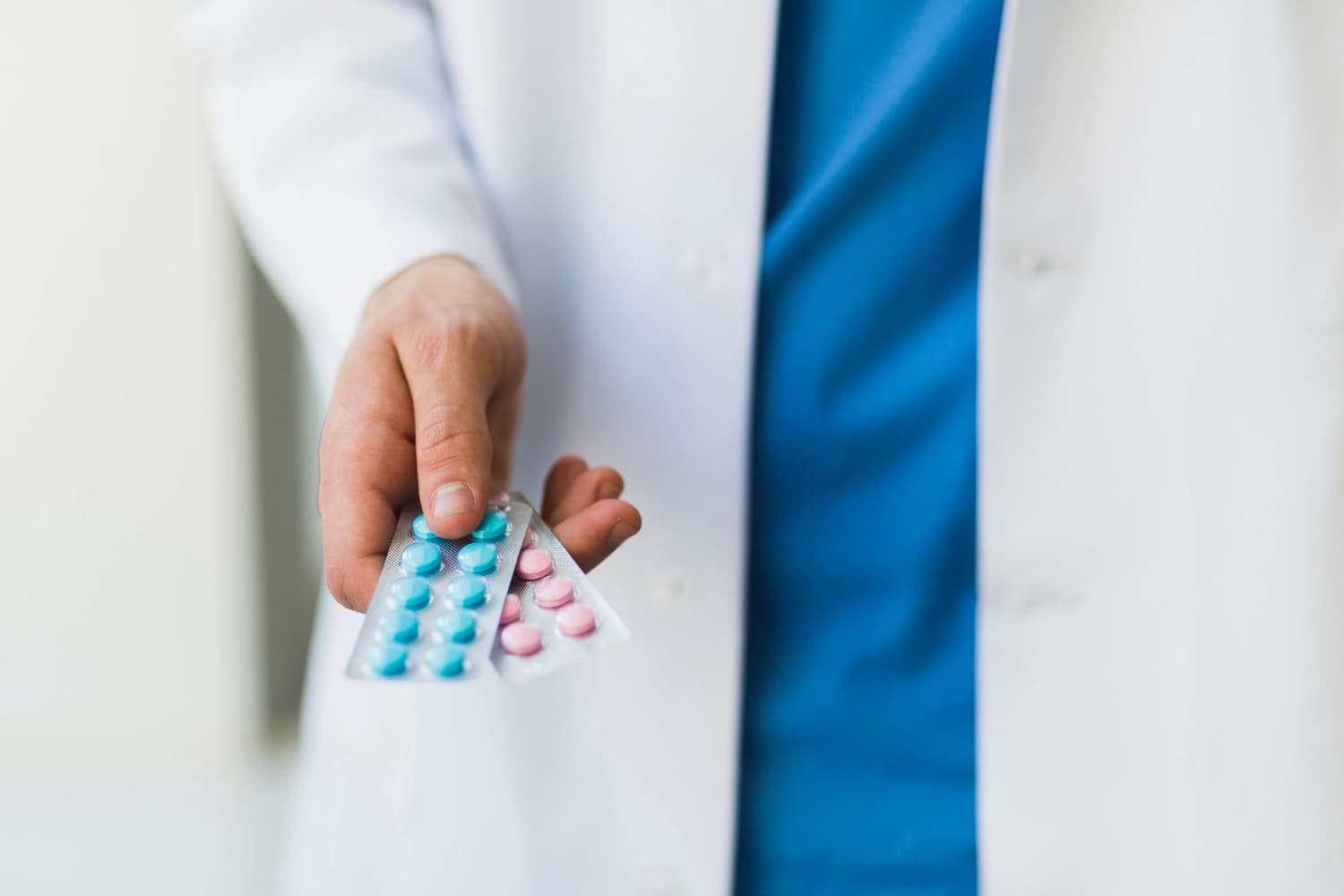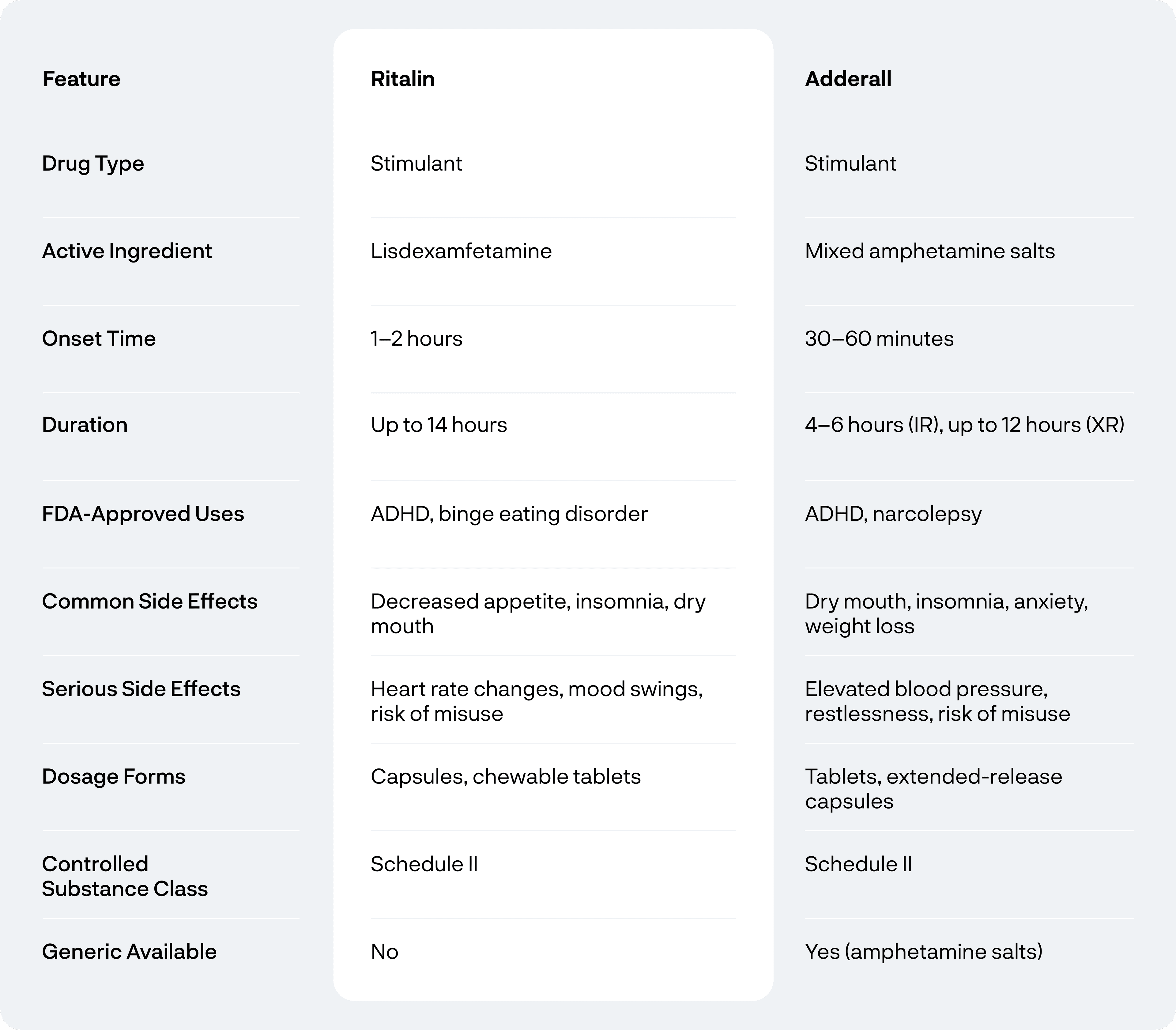Oct 06, 2025
Vyvanse vs. Adderall: Understanding ADHD Medication Options

THIS WEBSITE DOES NOT PROVIDE MEDICAL ADVICE. The content included on this website is for informational and educational purposes only. Always consult with your healthcare provider regarding any medical condition and before starting any healthcare or medication regimen.
Introduction
When it comes to treating attention deficit hyperactivity disorder (ADHD), finding the right medication can make a meaningful difference in everyday life. Vyvanse and Adderall are two widely prescribed stimulant medications that work by increasing certain chemical levels in the brain. Although they are both used to manage symptoms like inattention and impulsivity, they are not identical.
This article explains how Vyvanse and Adderall work, their approved uses, and how they compare in terms of side effects, duration, and cost. If you've been prescribed one of these medications, you may be able to save at the pharmacy by using a CareCard prescription discount card. No sign-up or insurance is required.
Conditions Treated by Stimulant Medications
ADHD and Its Impact on Daily Life
ADHD is a chronic condition that affects attention, behavior, and emotional regulation. It can interfere with school, work, relationships, and daily functioning for both children and adults.
When Medication Might Be Recommended
In many cases, behavioral therapy and lifestyle adjustments are recommended first. But when those interventions aren’t enough on their own, medications like Vyvanse or Adderall may be prescribed to help reduce core symptoms and improve focus.
What Is Vyvanse?
Active Ingredient and How It Works
Vyvanse contains lisdexamfetamine, a prodrug of dextroamphetamine. This means the medication becomes active only after it’s metabolized in the body. This gradual activation is thought to lower the potential for misuse. Vyvanse works by increasing dopamine and norepinephrine—two neurotransmitters that help regulate attention and behavior.
Effectiveness of Vyvanse
Vyvanse has been shown to help reduce core symptoms of ADHD, such as inattention, impulsivity, and hyperactivity. It is FDA-approved for use in children, adolescents, and adults. Clinical research supports its role as a long-acting stimulant that can provide consistent symptom control throughout the day.
Dosage Forms and Administration
Vyvanse is available as:
Capsules (10 mg to 70 mg)
Chewable tablets (10 mg to 60 mg)
It is typically taken once daily in the morning, with or without food. Because it is long-acting, it does not require multiple doses throughout the day.
Common Side Effects of Vyvanse
Some people may experience:
Decreased appetite
Insomnia
Dry mouth
Irritability
Nausea or stomach discomfort
Drug Interactions and Safety Considerations
Vyvanse may interact with:
Monoamine oxidase inhibitors (MAOIs)
Medications that raise blood pressure
Acidifying agents (which may reduce absorption)
It is not recommended for individuals with a history of certain heart conditions or severe anxiety disorders.
The FDA label offers full safety information and prescribing guidance.
What Is Adderall?
Active Ingredient and How It Works
Adderall contains a mixture of amphetamine salts, which stimulate the central nervous system to increase levels of dopamine and norepinephrine. It is available in immediate-release (IR) and extended-release (XR) forms.
Effectiveness of Adderall
Adderall is widely prescribed and has demonstrated consistent benefits in improving focus, attention, and impulse control. It is approved for use in children as young as three and in adults. Its effectiveness has been evaluated in multiple clinical settings, showing symptom improvement in both short- and long-term use. This study found that Adderall significantly reduced ADHD symptoms compared to placebo in adults receiving treatment.
Dosage Forms and Administration
Adderall is available as:
Tablets (IR): 5 mg to 30 mg, usually taken once or twice daily
Capsules (XR): 5 mg to 30 mg, taken once daily
The extended-release form provides longer coverage and may be preferred for individuals needing all-day symptom management.
Common Side Effects of Adderall
Common effects include:
Dry mouth
Anxiety
Insomnia
Weight loss
Increased heart rate
Drug Interactions and Safety Considerations
Adderall may interact with:
MAO inhibitors
Antidepressants
Medications that affect blood pressure or heart rhythm
It may not be appropriate for individuals with a history of substance use disorder or cardiovascular risk.
This NIH resource provides clinical context for amphetamine-based treatments.
Vyvanse vs. Adderall: Key Differences
Onset Time and Duration of Action
Vyvanse generally takes 1 to 2 hours to begin working and lasts up to 14 hours. Adderall typically starts working within 30 to 60 minutes, with immediate-release effects lasting 4 to 6 hours and extended-release effects lasting up to 12 hours.
Approved Uses
Vyvanse is approved for:
ADHD in patients aged 6 and older
Binge eating disorder in adults
Adderall is approved for:
ADHD in patients aged 3 and older
Narcolepsy
Side Effect Profile Comparison
Vyvanse is associated with a smoother onset and offset of effects, which may reduce the “crash” some individuals feel after stimulant use. Adderall may be more likely to cause anxiety or restlessness in sensitive users. However, individual response varies.
Availability and Cost Considerations
Vyvanse is only available as a brand-name medication, which can make it more expensive. Adderall is available in both brand-name and generic forms, making it generally more affordable.
Vyvanse vs. Adderall Comparison Chart

How to Choose Between Vyvanse and Adderall
Talking to Your Health Care Provider
Your provider will consider factors like:
Duration of coverage needed
Coexisting conditions (such as anxiety, sleep issues, or eating disorders)
Sensitivity to side effects
Risk of misuse or dependency
Individual Response and Tolerance
No two individuals respond to stimulant medications in exactly the same way. Some people tolerate Vyvanse better due to its slower onset, while others may prefer Adderall’s faster action or shorter duration.
How to Save on ADHD Medications
Using Prescription Discount Cards
Whether you're prescribed brand-name Vyvanse or generic Adderall, medication costs can add up. Prescription discount cards offer savings for those paying out of pocket or whose insurance doesn't fully cover their prescriptions.
How Carecard Can Help Lower Costs
The CareCard prescription discount card brings together pricing from over 80,000 participating pharmacies—including mom and pop shops—to help reduce the cost of medications. Members can save up to 85% without insurance or fees.
Conclusion
Vyvanse and Adderall are two effective ADHD medications that share similarities but offer different benefits depending on your needs. Vyvanse provides long-lasting, steady coverage and may be a good fit for those concerned about the highs and lows sometimes associated with other stimulants. Adderall offers flexible dosing options, faster onset, and the potential for lower cost.
Choosing between them should involve a thoughtful conversation with your health care provider, based on your unique health profile, lifestyle, and response to treatment. If you're concerned about the price of either medication, CareCard may help reduce out-of-pocket costs at your local pharmacy.
Frequently Asked Questions
1. Is Vyvanse stronger than Adderall? Vyvanse may last longer, but strength depends on individual response, not just duration. Your provider can guide the best fit based on your symptoms.
2. Can Vyvanse and Adderall be used interchangeably? They are sometimes substituted, but only under medical supervision. The active ingredients and effects are different.
3. Does Vyvanse have a generic version? No, Vyvanse is only available as a brand-name medication.
4. Which medication is better for binge eating disorder? Only Vyvanse is approved by the FDA for the treatment of binge eating disorder in adults.
5. How can I find lower prices for Vyvanse or Adderall? You can use a CareCard discount card to compare prices and save—no sign-up or insurance required
